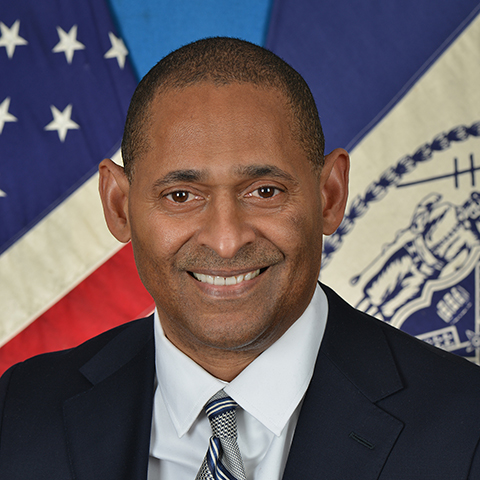Mark Stewart, the recently retired NYPD deputy commissioner for community affairs, has been awarded a lucrative ¾ disability pension, the Daily News has learned – following a similarly generous benefit bestowed on departed Chief of Department John Chell.
Stewart, who previously retired as a detective in 2004, rejoined the department as a civilian in February 2022 at the start of the Adams administration and then retired again on Oct. 8 and was approved for an accident disability pension worth $18,241.16 a month or $218,893.92 a year, the city Police Pension Fund confirmed Nov.3. Stewart earned a $275,577 salary in fiscal 2025.
It is rare for a civilian to receive such a benefit from the fund, three pension lawyers who spoke with The News said. A public records request submitted by The News to the Pension Fund for statistics on pension approvals was pending as of publication.
“It’s highly unusual,” said lawyer Jeffrey Goldberg, who has represented cops in pension cases for decades.
Chell’s special pension also followed an unusual path. He retired Oct. 8 on a disability pension worth $295,919.64 annually. He told The News his pension was based on an ankle injury he suffered on Randall’s Island while working a migrant operation in July 2024.
“The system is the system,” he told The News in an interview Oct. 24.
But the pension lawyers said in a process that is largely cloaked from public view, a mere patrol cop with the same injury as Chell claimed could well face initial denial and years of litigation.
“The Pension Board routinely contests all those types of injuries,” Goldberg said.
In a third case, the News has also learned that sitting Probation Commissioner Juanita Holmes, a former NYPD chief, has applied for the ¾ disability pension, three city government sources said. Holmes filed her retirement papers on Oct. 30 with an effective date of Nov. 28, NYPD records show.
Holmes, the sources said, was in SOMOS the weekend of Nov. 9 attempting to lobby aides to Mayor-Elect Mamdani to be reappointed despite a bumpy tenure at the agency. Her rep did not reply to Daily News inquiries.
It was unclear what she was citing as qualifying her from the disability pension. By definition, a disability for pension purposes it is a condition incurred on the job that impedes the employee in some way from performing all the tasks required.
The Adams connection
All three officials have been allies of Mayor Adams, with Stewart and Holmes having a relationship with him that goes back decades. Reps for the mayor would not say if he was involved in any way in the decision, though he controls three votes on the pension board.

The cases of Chell and Stewart are also notable because they appear to have received their special pensions relatively quickly, compared to the more arduous process rank-and-file cops often have to endure, according to the pension lawyers.
“There’s no way these people are entitled to a 3/4 pension especially when they routinely deny police officers the same type of pension who were actually seriously injured while doing actual law enforcement,” said Tim McEnaney, another lawyer specializing in police and fire pension litigation.
Stewart’s case follows an unusual trajectory.
He was a transit cop from 1984 to 1988 then in various NYPD units after the transit police merged with the NYPD. At one point in his police career, he was the driver for Chief Philip Banks, later a deputy mayor for Adams, a source familiar with that assignment said.
He retired from the NYPD in 2004 as a detective second grade obtaining a regular service pension at that point.
He then went to work for the Manhattan District Attorney’s office in April 2006, records show. Stewart departed the DA’s office in February 2022 as Supervising Rackets Investigator, the records show.
Days later, on Feb. 28, 2022, Stewart returned to the NYPD. Mayor Adams’s first police commissioner, Keechant Sewell, appointed him to lead the Community Affairs Bureau. Stewart was thus considered fit enough to oversee hundreds of cops in that unit in what was a largely administrative, civilian position.
On Oct. 8, after nearly four years, he retires with the disability pension, the basis of which is not entirely clear. He did not reply to a request for comment and officials with the NYPD and the pension fund would not disclose it.
McEnaney questioned the propriety of giving a high official such a valuable benefit given the broader context. Police officers sue the Pension Fund for denial of disability pensions roughly five times a month, court records show. A review of complaints by The News shows the cops often spend years just clearing bureaucratic hurdles before they can finally sue.
The lawsuits seem to fall into three general categories – claims stemming from 9/11, claims involving heart ailments and claims involving injuries sustained either taking police action or accidents in a police facility.
“You can easily wait six months to get the medical board finding, then spend a couple years going through the system, then a couple more years in litigation and still not get it,” McEnaney said.
On the other hand, a police union official who requested anonymity insisted that a wide range of cops are approved for disability pensions and in reasonable amounts of time.
“I get the optics, but a ton get approved,” the official said.
On Nov. 12, the pension board approved the accident disability pensions for 38 cops, including one deputy chief – John Walsh, records obtained by The News show. But McEnaney said the universe of denials is much, much larger.
“That many approvals would represent only the tiniest fraction of applications that were denied during that same month,” he said. “What you also don’t see is the number of applications rejected and how many times the people who were finally approved had to be examined and reexamined by the medical board before being approved.”
Six Years of Litigation
Dennis O’Brien, just as one example of many, joined the NYPD in 2007 and sustained several line-of-duty injuries over the next 16 years, court records show. In 2013, he fell out of a police vehicle, in 2014, he wrenched his back responding to a call, and in 2015, he hurt his back again carrying a woman in a wheelchair up a set of stairs.
He was off full duty for six months but continued to have documented medical issues after he returned to work. But he was denied the disability pension by the Medical Board in 2019.
The Board found he was permanently disabled from working as a cop but that he did not merit the more lucrative pension because the documentation “does not support a causal relationship between the line of duty injury and the appearance of the (back injury).”
In 2020, the board conducted a second review and again denied him. Over the next two years, he continued to file paperwork and was reviewed two more times, but in April 2023, the pension board voted a 6 to 6 tie.
In these cases, a tie goes not to the runner, but to the city. O’Brien was denied the ¾ pension. He sued then Police Commissioner Edward Caban in state court calling the decision “arbitrary, capricious and contrary to the evidence.”
The case file swelled to 50 entries. Later in 2023, a judge ordered the case back to the Medical Board for further review.
Two more years have passed. The case is still pending
The 85-year-old Police Pension Fund was formed in 1940. Its decisions are made by a medical board and a Board of Trustees made up of representatives of the Mayor, NYPD, city Finance, the city Comptroller and the five police unions.
Kevin Holloran, the executive director of the Pension Fund for the past 15 years, did not reply to emails from The News. Holloran was appointed to the post by then Police Commissioner Raymond Kelly in 2010 after he was an inspector in the NYPD Medical Division.
The NYPD referred an inquiry to the pension fund.
Asked about Stewart and Holmes, Liz Garcia, a spokeswoman for Mayor Adams, said disability pension applications and medical information are confidential under federal, state and local laws.
“Are you implying that people with disabilities can’t be employed or leaders?” she added, referring to Holmes.








